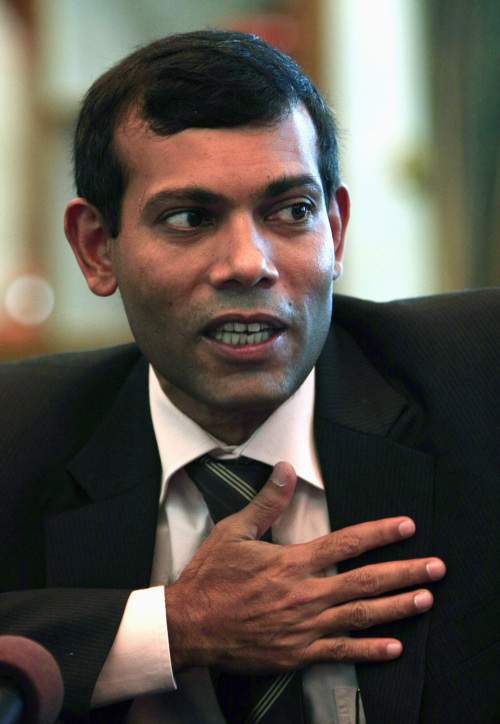MALE, Maldives (AP) ― The first democratically elected president of the Maldives resigned Tuesday and was replaced by his vice president after the police and army clashed in the streets of the island nation amid protests over the arrest of a top judge.
Mohammed Waheed Hassan, who previously worked as a top UNICEF official, was sworn in as the new Maldivian president in the afternoon. Soon after, the judge was released.
In a televised address, Hassan promised to protect his predecessor, Mohamed Nasheed, from retribution and called for the chaos in the streets to stop.
“I urge everyone to make this a peaceful country,” he said.
Nasheed’s resignation marked a stunning fall for the former human rights campaigner who defeated the nation’s longtime ruler in the country’s first multiparty election. Nasheed was also an environmental celebrity, traveling the world to persuade governments to combat the climate change that could raise sea levels and inundate his archipelago nation.
 |
Maldives President Mohammed Nasheed. (AP-Yonhap News) |
Nasheed presented his resignation in a nationally televised address after police joined the protesters and then clashed with soldiers in the streets. Some of the soldiers then defected to the police side.
“I don’t want to hurt any Maldivian. I feel my staying on in power will only increase the problems, and it will hurt our citizens,” Nasheed said. “So the best option available to me is to step down.”
Maldivians waving flags poured into the streets to celebrate Nasheed’s resignation. Some playfully threw water at each other.
“This is a change which was long overdue. The country has lost its Islamic values and economy,” government worker Mohamed Muthalib said. “Corruption is very high and this has affected the economy.”
Hassan Saeed, a former attorney general and Nasheed ally, hoped that Nasheed’s resignation ends political bickering that has become a hallmark since the country became a multiparty democracy.
“I am happy that the rule of law and justice prevailed,” he said.
Mohammed Waheed Hassan, who was educated at Stanford University in California, was the first television anchor in Maldives history and the first person shown live when local TV went on the air in 1978, according to his official biography.
He became a top education official in the country, but eventually left under duress after getting elected to Parliament and incurring the ire of the autocratic government ruling in the 1990s, his biography said. He joined UNICEF and rose to be its representative in Afghanistan, helping rebuild schools and provide health services after the fall of the Taliban.
U.S. State Department spokeswoman Victoria Nuland said that Hassan had informed the U.S. that the security situation in the Maldives was now under control and generally peaceful.
In a phone call with Assistant Secretary of State Robert Blake, Hassan expressed his strong commitment to a peaceful transition of power and the preservation of democracy.
According to Nuland, the new Maldivian leader expressed his intent now to form a national unity government with opposition participation, in the lead-up to the presidential election scheduled for November 2013.
Hassan’s office denied widespread reports that the military pressured Nasheed to resign in the wake of the clashes.
“It was not a coup at all. It was the wish of the people,” said Ahmed Thoufeeg, Hassan’s secretary.
An adviser for Nasheed, who spoke on condition of anonymity because of the sensitivity of the situation, also dismissed claims the resignation came under duress from the military.
The adviser said Nasheed was left with two choices: order a bloody military crackdown on the police dissidents or resign.
The latest protests in this Indian Ocean nation known for its lavish beach resorts erupted after Nasheed ordered the military to arrest Abdulla Mohamed, the chief judge of the Criminal Court. The judge had ordered the release of a government critic he said had been illegally detained.
The critic, opposition leader Mohamed Jameel Ahmed, had been arrested for allegedly defaming the government during a television interview in which he accused Nasheed’s government of working against the state religion, Islam, with the support of Christians and Jews. Religious debates have gained prominence in this Sunni Muslim nation of 300,000 people where practicing any other faith is forbidden.
Hassan ― then the vice president ― the Supreme Court, Human Rights Commission, Judicial Services Commission and the office of the United Nations High Commissioner for Human Rights all called for Judge Mohamed to be released.
Nasheed’s government accused the judge of political bias and corruption, said the country’s judicial system had failed and called for U.N help to solve the crisis.
The crisis came to a head Tuesday when hundreds of police demonstrated in the capital, Male, after officials ordered them to withdraw protection for government and opposition supporters protesting close to each other. The withdrawal resulted in a clash that injured at least three people.
Later, troops fired rubber bullets and clashed with the police. When Nasheed visited the police and urged them to end the protest, they refused and instead chanted for his resignation. Mohamed was released after Hassan took power.








